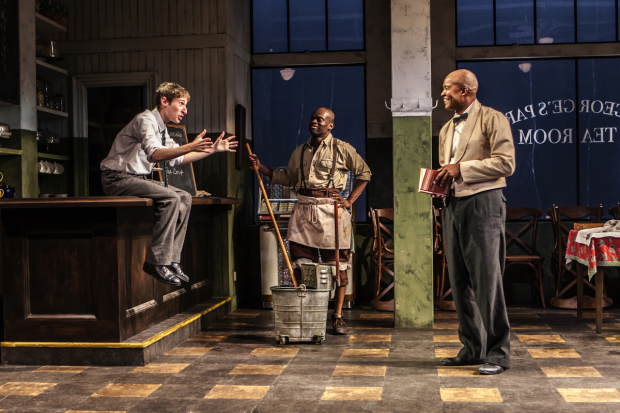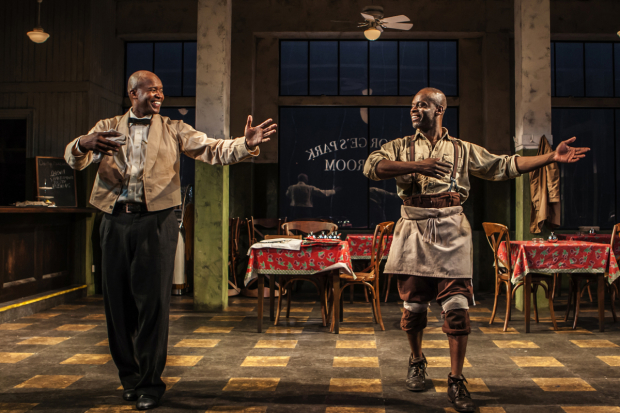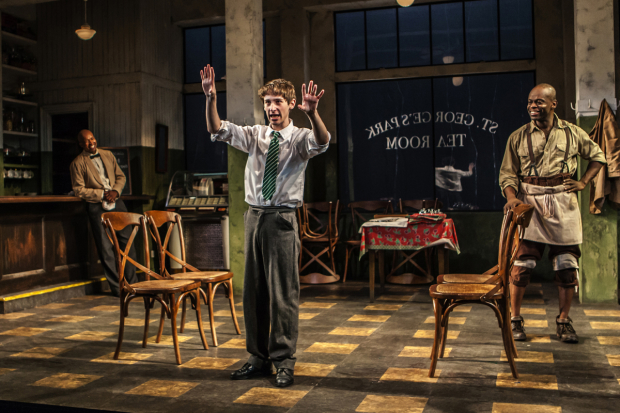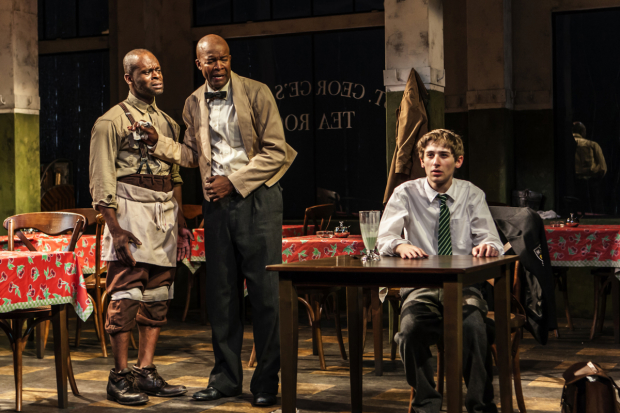
(© Monique Carboni)
When it rains, it pours in the Signature Theatre's lavish revival of Athol Fugard's "Master Harold"…and the Boys. Directing his own work, Fugard has built a production that pulls out all the technical stops (including torrential rain onstage) while employing some top-notch actors to perform his drama of soft bigotry and the lost promise of change. It's a beautifully rendered yet somewhat sleepy revival of Fugard's best-known work, which feels unfortunately diminished amid its own grandiosity.
Master Harold premiered at the Yale Repertory Theatre in 1982, and a Broadway run quickly followed. It was revived on Broadway in 2003. Its popularity stems from the universal resonance of its themes: Although set in South Africa circa 1950, the play uses the specific circumstances of apartheid to comment on the insidious nature of oppression, in which an imbalance of power will always spoil whatever affection has been built up between human beings.

(© Monique Carboni)
The action takes place over the course of a rainy late afternoon at the St. George's Park Tea Room in Port Elizabeth. Two employees, Sam (Leon Addison Brown) and Willie (Sahr Ngaujah), leisurely clean up. Willie is anxious about an upcoming ballroom-dance competition, so he stops to practice his steps and receive advice from Sam, an old champion. When Hally (Noah Robbins) arrives from school, he gives Willie a round of applause. Hally is the store owner's teenage son and has known the two men since he was a little boy. He is especially close to Sam, engaging him in long chats about great men and big ideas. But when Hally's mother phones from the hospital to tell him that his alcoholic father is coming home earlier than expected, Hally's filial anxiety threatens to break these bonds of love and comradery.
Hally's relationship with his father is a complicated mixture of love and shame: Recollections of laughter (sometimes induced by racist jokes) dance with harsher memories of Sam carrying dad from the bar where he passed out drunk, a very young Hally in tow. It's no coincidence that our teenage protagonist's name recalls the most famous coming-of-age story in the Shakespeare canon. Like the young Prince who would become Henry V, Hally stands to inherit a kingdom from a less-than-loving father; in order to do so, he'll have to betray his friends, including his surrogate dad, Sam.
Granted, the allusion isn't perfect: As portrayed by Brown, Sam is a thousand times wiser than Falstaff. He's endlessly patient with Hally, encouraging his curiosity and gently questioning him. You can tell that he truly wants Hally to be part of a generation that ends the racial oppression in his country, a hope that persists even when Hally lashes out or says something offensive.

(© Monique Carboni)
"Tolstoy may have educated his peasants, but I've educated you," the 17-year-old Hally says to the fortysomething Sam, leading us to grimace as Sam merely responds with a relaxed smile. Sporting an unwavering South African accent, Robbins perfectly embodies the callous know-it-all teenager. Between his mood swings, it is hard to tell when adolescent arrogance blossoms into full-blown chauvinism, but the seed is always there.
As Willie, Ngaujah is mostly a silent witness to the unfolding drama: Calling the scion of his employer "Master Harold" from the very beginning (rather than the informal "Hally"), he is never as invested in this relationship as Sam, wisely insulating his heart. Ngaujah exhibits this detachment as he dutifully mops the floors: He's not refraining from joining the conversation because he is dim — he's doing it out of self-preservation.
Set designer Christopher H. Barreca has given Ngaujah truly filthy floors: The dirt trekked in by thirsty customers makes his stage business seem real and urgent, if Sisyphean (the floors never really look clean). The effect of rain trickling down the upstage windows at intermittent spurts (as it would in a coastal town) further creates the feeling of a depressingly muddy afternoon. Lighting designer Stephen Strawbridge delivers an authentic dusk as the cloudy afternoon stealthily gives way to evening without us noticing the shift until it is fully dark. Susan Hilferty's costumes round out the story, with Sam's jaundiced uniform jacket revealing his longstanding loyalty to this store and the family that owns it.
Under Fugard's steady direction, Master Harold reaches its emotional climax at a slow boil. This is as it should be, but the necessarily nuanced performances occasionally drown in the cavernous Diamond Theater, leaving us wishing for a more intimate space where we aren't so safely protected from the powder keg of racial tension that threatens to ignite at any moment. One can just imagine the impact of an environmental production that brings the audience into the tea room and recognize this standard proscenium revival as a missed opportunity for such experimentation.

(© Monique Carboni)
Still, those looking for a traditional and well-acted production of Fugard's masterpiece won't be disappointed. Master Harold is the tragedy of the triumph of entrenched injustice over love, a story that is all too relevant today — and likely will be for a long time.









